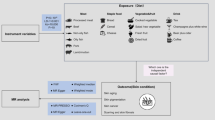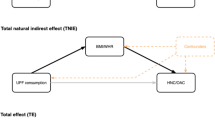Abstract
Objectives: Tea polyphenols have been shown to exhibit anti-cancer activity, but the epidemiological findings are inconsistent. We examined the association between tea consumption and colon cancer in a population-based study in North Carolina. Methods: The analysis included 630 cases and 1040 controls frequency matched to cases by age, gender, and race. The odds ratios (OR) for tea consumption, adjusted for age and gender, were calculated for African-Americans and Whites and effect modification by race was explored. Results: No association was found between tea consumption and colon cancer overall. Compared to non-consumers, those who consumed <2 servings/r ≥2 servings/day had OR = 0.9 (95% CI: 0.7–1.2) and OR = 1.3 (95% CI: 0.9–1.8) respectively. Other risk factors for colorectal cancer (family history of colorectal cancer, exposure to non-steroid anti-inflammatory drugs, meat cooking practices, smoking, physical activity, body mass index, intake of red meat, fruits, vegetables, and alcoholic beverages) did not influence these associations. We did not find any evidence of effect modification by race on either on the multiplicative or additive scale. Conclusion: We conclude that, contrary to expectation, tea drinking did not decrease the risk of colon cancer in this study population.
Similar content being viewed by others
References
Gescher AJ, Sharma RA, Steward WP (2001) Cancer chemoprevention by dietary constituents: a tale of failure and promise. Lancet Oncol 2: 371-379.
Kelloff GJ (2000) Perspectives on cancer chemoprevention research and drug development. Adv Cancer Res 78: 199-334.
Yang CS, Maliakal P, Meng X (2002) Inhibition of carcinogenesis by tea. Annu Rev Pharmacol Toxicol 42: 25-54.
Kohlmeier L, Weterings KG, Steck S, Kok FJ (1997) Tea and cancer prevention: an evaluation of the epidemiologic literature. Nutr Cancer 27: 1-13.
Baron JA, Gerhardsson D, Ekbom A (1994) Coffee, tea, tobacco, and cancer of the large bowel. Cancer Epidemiol Biomarkers Prev 3: 565-570.
Cerhan JR, Putnam SD, Bianchi GD, Parker AS, Lynch CF, Cantor KP (2001) Tea consumption and risk of cancer of the colon and rectum. Nutr Cancer 41: 33-40.
Dales LG, Friedman GD, Ury HK, Grossman S, Williams SR (1979) A case-control study of relationships of diet and other traits to colorectal cancer in American blacks. Am J Epidemiol 109: 132-144.
Fredrikson M, Hardell L, Bengtsson NO, Axelson O (1995) Colon cancer and dietary habits-a case-control study. Int J Oncol 7: 133-141.
Goldbohm RA, Hertog MG, Brants HA, van Poppel G, vanden Brandt PA (1996) Consumption of black tea and cancer risk: a prospective cohort study. J Natl Cancer Inst 88: 93-100.
Hartman TJ, Tangrea JA, Pietinen P, et al. (1998) Tea and coffee consumption and risk of colon and rectal cancer in middle-aged Finnish men. Nutr Cancer 31: 41-48.
Higginson J (1966) Etiological factors in gastrointestinal cancer in man. J Natl Cancer Inst 37: 527-545.
Inoue M, Tajima K, Hirose K, et al. (1998) Tea and coffee consumption and the risk of digestive tract cancers: data from a comparative case-referent study in Japan. Cancer Causes Control 9: 209-216.
Ji BT, Chow WH, Hsing A, et al. (1997) Green tea consumption and the risk of pancreatic and colorectal cancers. Int J Cancer 70: 255-258.
Su LJ, Arab L (2002) Tea consumption and the reduced risk of colon can. Public Health Nutr 5: 419-426.
Kinlen LJ, Willows AN, Goldblatt P, Yudkin J (1988) Tea consumption and cancer. Br J Cancer 58: 397-401.
Munoz SE, Navarro A, Lantieri MJ, et al. (1998) Alcohol, methylxanthine-containing beverages, and colorectal cancer in Cordoba, Argentina. Eur J Cancer Prev 7: 207-213.
Nakachi K, Matsuyama S, Miyake S, Suganuma M, Imai K (2000) Preventive effects of drinking green tea on cancer and cardiovascular disease: epidemiological evidence for multiple targeting prevention. Biofactors 13: 49-54.
Olsen J, Kronborg O (1993) Coffee, tobacco and alcohol as risk factors for cancer and adenoma of the large intestine. Int J Epidemiol 22: 398-402.
Slattery ML, Caan BJ, Anderson KE, Potter JD (1999) Intake of fluids and methylxanthine-containing beverages: association with colon cancer. Int J Cancer 81: 199-204.
Tavani A, Pregnolato A, LaVecchia C, Negri E, Talamini R, Franceschi S (1997) Coffee and tea intake and risk of cancers of the colon and rectum: a study of 3530 cases and 7057 controls. Int J Cancer 73: 193-197.
Terry P, Wolk A (2001) Tea consumption and the risk of colorectal cancer in Sweden. Nutr Cancer 39: 176-179.
Woolcott CG, King WD, Marrett LD (2002) Coffee and tea consumption and cancers of the bladder, colon and rectum. Eur J Cancer Prev 11: 137-145.
Zhang B, Li X, Nakama H, et al. (2002) A case-control study on risk of changing food consumption for colorectal cancer. Cancer Invest 20: 458-463.
Zheng W, Doyle TJ, Kushi LH, Sellers TA, Hong CP, Folsom AR (1996) Tea consumption and cancer incidence in a prospective cohort study of postmenopausal women. Am J Epidemiol 144: 175-182.
Baquet CR, Commiskey P (1999) Colorectal cancer epidemiology in minorities: a review. J Assoc Acad Minor Phys 10: 51-58.
Hargreaves MK, Baquet C, Gamshadzahi A (1989) Diet, nutritional status, and cancer risk in American blacks. Nutr Cancer 12: 1-28.
Smit E, Nieto FJ, Crespo CJ, Mitchell P (1999) Estimates of animal and plant protein intake in US adults: results from the Third National Health and Nutrition Examination Survey, 1988-1991. J Am Diet Assoc 99: 813-820.
Weinberg CR, Sandler DP (1991) Randomized recruitment in case-control studies. Am J Epidemiol 134: 421-432.
Weinberg CR, Wacholder S (1990) The design and analysis of case-control studies with biased sampling. Biometrics 46: 963-975.
Block G, Hartman AM, Dresser CM, Carroll MD, Gannon J, Gardner L (1986) A data-based approach to diet questionnaire design and testing. Am J Epidemiol 124: 453-469.
Gerber AM, James SA, Ammerman AS, et al. (1991) Socioeconomic status and electrolyte intake in black adults: the Pitt County Study. Am J Public Health 81: 1608-1612.
Hosmer DW, Lemeshow S (1992) Confidence interval estimation of interaction. Epidemiology 3: 452-456.
US Department of Health and Human Services (DHHS). Second National Health and Nutrition Examination Survey I Epidemiologic Followup Study, 1982-84. NCHS. 2001. NCHS.
Hakim IA, Hartz V, Harris RB, et al. (2001) Reproducibility and relative validity of a questionnaire to assess intake of black tea polyphenols in epidemiological studies. Cancer Epidemiol Biomarkers Prev 10: 667-678.
Hakim IA, Weisgerber UM, Harris RB, et al. (2000) Preparation, composition and consumption patterns of tea-based beverages in Arizona. Nutr Res 20: 1715-1724.
Balentine DA, Wiseman SA, Bouwens LC (1997) The chemistry of tea flavonoids. Crit Rev Food Sci Nutr 37: 693-704.
Segal M (1996) Tea: a story of serendipity. FDA Consumer 30: 22-26.
Inoue M, Tajima K, Hirose K, et al. (1997) Epidemiological features of first-visit outpatients in Japan: comparison with general population and variation by sex, age, and season. J Clin Epidemiol 50: 69-77.
Il'yasova D, Arab L, Martinchik A, Weisgerber UM (2000) Preliminary analysis of a population based case-control study on rectal cancer and black tea consumption among Moscow residents. Faseb J 14: A523.
Author information
Authors and Affiliations
Corresponding author
Rights and permissions
About this article
Cite this article
Il'yasova, D., Martin, C. & Sandler, R.S. Tea intake and risk of colon cancer in African-Americans and Whites: North Carolina colon cancer study. Cancer Causes Control 14, 767–772 (2003). https://doi.org/10.1023/A:1026371307954
Issue Date:
DOI: https://doi.org/10.1023/A:1026371307954




